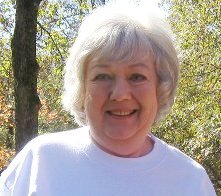So far in March 2023, we are experiencing near-record snowfalls here in Minnesota. So far more than 80 inches have fallen, and another big storm is predicted to come this week (March 16-17). Being semi-housebound, I have occupied my time by sorting through papers and organizing files. It is my version of Spring Cleaning. Today I found an assignment written by my first cousin Frieda more than 20 years ago when we had a small writing group meeting at the Methodist Church in Pineville, MO. I thought it was worth sharing as it chronicles the way our shared Grandmother Bunch coped with her life in the 1930s. It was a first draft, so I have lightly edited it for clarity.
By
Frieda Lines Royer
During my lifetime there were many who, at different
times influenced my personality. But perhaps the most prominent model
for living was my grandmother with whom I spent much time when growing
up. I never heard Granny complain although her life was fraught with
tragedies and disappointments. Her oldest of seven children died in
France during World War I and her youngest son experienced problems that
caused her great heartache—never reaching his potential. She often
quoted a Bible verse or sang a hymn that seemed to soothe the pain she
felt as she went through the long days of labor which was her role as a
farm wife.
Her goal was to provide love and stability to “her”
household. She was up at dawn preparing a gourmet breakfast complete
with meat from the smokehouse, hot biscuits, home-churned butter, eggs
from the chickens she incubated and raised, and numerous condiments from
her having canned blackberries, huckleberries, etc. that she gathered
from the fields, and woods. Then she milked the cows, strained, and
poured the creamy milk into large cans to be picked up by truck. She
kept enough for her own use, separating it with a hand-operated machine
into skim milk and thick cream.
When the outside chores were finished; it was time
to clear the kitchen of breakfast dishes. before the trip to the immense
garden where corn, potatoes, onions, and a myriad of other vegetables
were gathered to fill the deep-well cooker or the wood-burning stove
which held “always ready” soup. Also, “starter” had to be made into
bread dough to rise for the rolls or loaves that must be baked at just
the right time for dinner. Preparing this big meal of the day for the
harvest hands who came in at noon took most of the morning after which
came Granny’s only recreation of the day when she lay on the living room
floor and listened to the soap opera “Stella Dallas”.
Afternoons could be spent sewing on a pedal machine
or gleaning from nature – foods such as hazelnuts and black walnuts or
preparing crocks of sauerkraut, pickles, et. For storage in the deep
cellar dug into damp cool rocks to keep foods cool. The kerosene lamps
had to be filled with oil and the chimneys cleaned. The gas lanterns
needed an occasional mantle change so light would be available after
sundown. Laundry day came once a week with water boiling in the big
kettle over an outdoor fire. All scrubbing was done by hand with a
washboard and lye soap which had been made in the same pot. Often, the
water left over from boiling “whites” to the shade of snow was used to
scrub the rough-hewn log floor of the kitchen. Lye was added to the
water to bleach the white oak boards and then followed by many buckets
of rinse water carried from the well.
When I am tired and hurting with tasks waiting, I
think of times when in spite of a diagnosed heart condition, Granny
would chase an errant calf back to the pasture and return to the house
saturated with sweat. Recalling her hardships and the courage she
possessed give me the willpower to go beyond what I perceive to be my
limit (at times!)
Granny was fun to be with and could tell
interesting stories such as when they buried the family silverware and
wedding rings during the Civil War. Shad had little money because
profits were spent mostly on the best of equipment to keep the farm
running smoothly. She took extra eggs and cream to the market and spend
her cash proceeds to buy treats like bakery-sliced bread and candies for
her grandchildren.
She rode to town in the rural mailman’s pick-up
(for 10 cents a trip). She loved iced drinks and sometimes would take a
gunny sack with her, buy a 50-pound block of ice and, somehow, manage to
get it home from the mailbox drop-off more than a mile away from her
home. What joy she brought to share with others as she did with Sunday
fried chicken dinners for the kids and grandkids who always arrived on
time to eat even if they had to walk six miles to the farm. Dishes were
washed with well water carried into the house in a bucket and heated on
the kitchen stove. They were rinsed and scalded with boiling water
before drying on lovingly embroidered feed sack towels.
Lessons learned from my precious grandmother have helped me through many of my life’s crises.






No comments:
Post a Comment